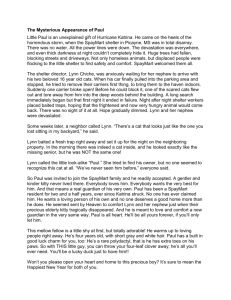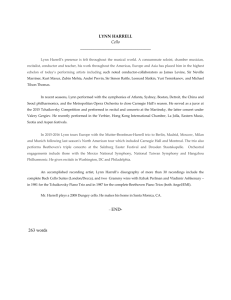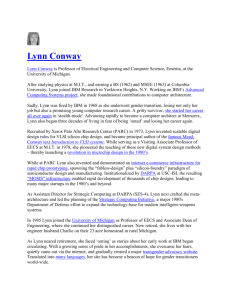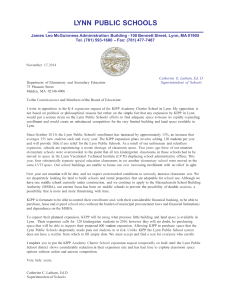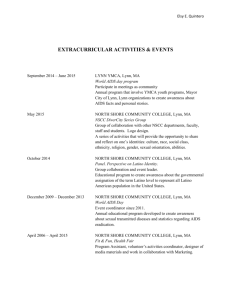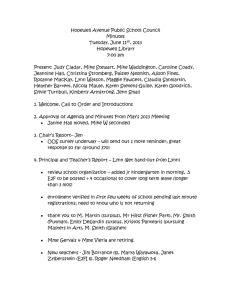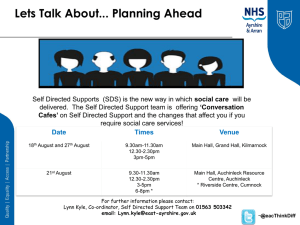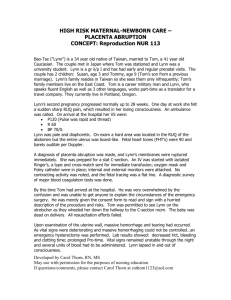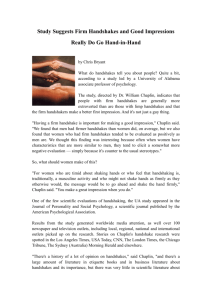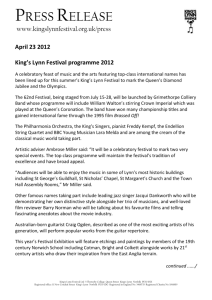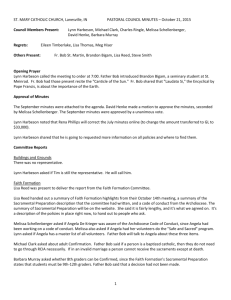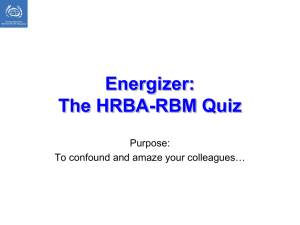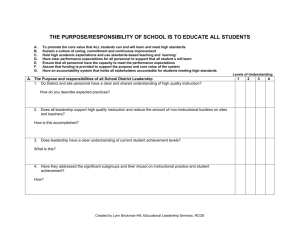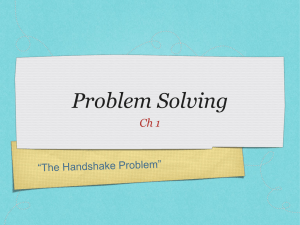GB PRESENTATION SLIDES WK 2:Explaining Your Job
advertisement
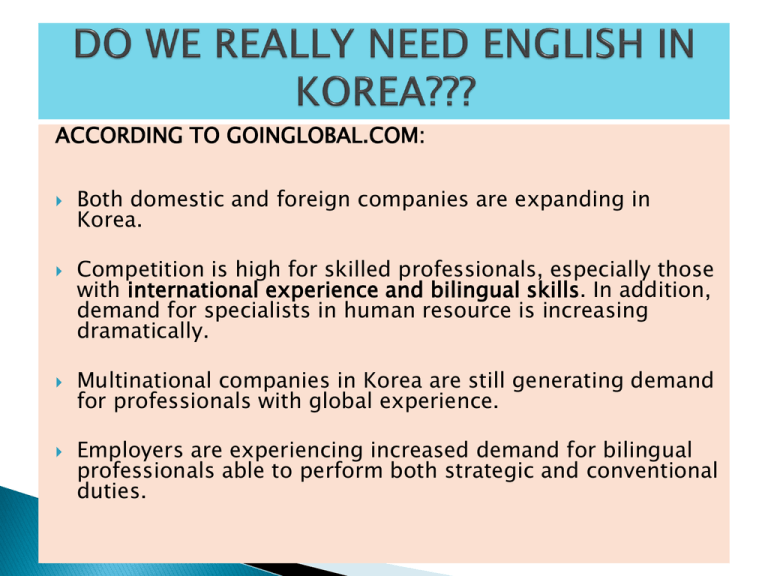
ACCORDING TO GOINGLOBAL.COM: Both domestic and foreign companies are expanding in Korea. Competition is high for skilled professionals, especially those with international experience and bilingual skills. In addition, demand for specialists in human resource is increasing dramatically. Multinational companies in Korea are still generating demand for professionals with global experience. Employers are experiencing increased demand for bilingual professionals able to perform both strategic and conventional duties. ACCORDING TO GOINGLOBAL.COM: Korea’s recent free trade agreements with the US and Europe are creating increased interest from MNCs, and Korean businesses are adopting more Westernized environments. These trends have created the need for more globally minded professionals, according to specialist recruiter Robert Walters. ACCORDING TO GOINGLOBAL.COM: In spite of its excellent educational system, the level of English proficiency in South Korea is generally lower than that in many other Asian countries. Professionals with bilingual skills, particularly in English, are difficult to find. Candidates with these skills are likely to be able to command higher salaries. EXPLAINING YOUR JOB/INDUSTRY Box :A market create offer design produce develop provide manufacture sell/retail Box B: banking services IT software clothing/household goods electronic goods food and drink internet services cars/automobiles entertainment GENERAL ELECTRIC GE is a diversified technology, media and financial services company. The company mission statement is to create products that make life better: from aircraft engines to industrial machinery to insurance, medical technology, television news and plastics. GE operates in more than 100 countries and employs more than 300,000 people worldwide. 1. Name two more industry sectors mentioned in the text: Technology… 2. Name two more things that GE produces: Aircraft Engines… 3. How many people work for GE? 4. Which word means that GE has many different business activities? 1. Think of a company in your country or town. 2. What are its main activities? 3. Does it specialize in one industry sector or is it diversified? 1. Music or other sounds on a video, film, etc. a. Programming 2. Pictures or images designed for a video game, computer program, etc. b. Shoot-emups 3. Writing a computer program. c. Soundtrack 4. The people in a video game, film, etc. d. Skyrocketing 5. Going up very fast. e. Graphics 6. Violent games where people shoot and kill each other. f. Characters 1. Read the article Move Over Game Boys. 2. Underline Frognation’s activities. 3. Circle the things Lynn Robson does in her work. 1. Frognation works on video games that sell in the F: Frognation represents UK. T 2. Lynn works mainly in producers with great ideas and helps them to sell their ideas to Tokyo. runs the UK office. SonyF: orLynn Nintendo. 3. Frognation does all the production work to prepare the games for the market. 4. Lynn knows a lot about Japanese culture. T 5. The video game industry is growing rapidly. T 6. Not many women work in the video game industry. T 1. What do you think are the good things about Lynn Robson’s job? What are the bad things? 2. What do you think of video games? Do video games usually appeal more to men and boys or women and girls? Why? 1. 2. 3. 4. 5. Founder Team Setup Partner Run (a business) E D A B C a. to start a company or organization. b. One of a number of people who own a business together. c. To be responsible for. d. A group of people who work together to do a job. e. Someone who starts a company or organization What do you call someone who works in each of the following areas? For example, a technical job- technician 1. accounts 2. art 3. banking 4. economics 5. engineering 6. music 1. 2. 3. 4. accountant artist banker economist 5. engineer 6. musician For Example, A financial ANALYST is someone who analyses the financial markets. 1. 2. 3. 4. 5. 6. ADVISOR A financial ____________ is someone who gives advice about financial services. REPRESENTATIVE A sales _____________ is someone who represents their company and sells their products. ASSISTANT An _____________ manager is someone who assists the manager. MANAGEMENT CONSULTANT A ___________ ____________ offers consultancy /consulting services to management. SOFTWARE DEVELOPER A __________ __________ is someone who develops software. FILM PRODUCER A _______ ________ is someone who produces films. 1. 2. 3. 4. Lynn runs the office at Frognation. Present Simple Video games sales are sky-rocketing at the moment. Present Continuous Lynn frequently travels to Japan for meetings. Present Simple Lynn is working at home this week. Present Continuous Use the PRESENT SIMPLE to describe: a. Regular or routine activities b. Permanent or long-term situations Use the PRESENT CONTINUOUS to describe: c. Something happening now d. A temporary situation Look at the following words: Normally everyday often sometimes frequently PRESENT SIMPLE Do we use the present simple or present continuous with these expressions? Look at the following words: at the moment this week PRESENT CONTINUOUS now currently Do we use the present simple or present continuous with these expressions? 1. We’re all accountants and we work / WORK are working for a telecommunications company in the finance department. 2. We sit / areSITsitting at our PCs in CHECK the office every day and check / are checking the invoices and payments. 3. But this week is ATTENDING different: we attendARE / are attending a training IS CURRENTLY CHANGING course. 4. The company currently changes / is currently changing to a new accounting system, and this week, we learn /ARE areLEARNING learning all about it. ARE/STAYING 5. So at the moment, we stay are staying at a big hotel in the mountains. 6. It’s wonderful! When we’re at home, we usually spend SPEND / are spending the evenings cooking and cleaning for our families. But here, there’s an excellent restaurant and we can relax and have a laugh together. Extra Practice: Do at Home 1. My working day (start) ______ with a long journey to the office-usually over an hour on a crowded train. The first event of a typical day is the regular morning meeting. 2. Our managers (give) ______ updates on the department’s progress. After that, it’s a long, hard day of work. 3. You can see me at work in this photo-I (give) ______ a presentation to my colleagues. 4. I often (stay) _____ in the office until 9 or 10pm. But this is the old way. 5. Now, things (begin) ______ to change. 6. Young people (refuse) ______ to work long hours. 7. They (demand) ______ more leisure time and freedom. 1. 2. 3. 4. 5. 6. 7. starts give am giving stay are beginning are refusing are demanding 1. Anna Davidson, a training manager and expert in business communication, talks about virtual teams: international teams which communicate mainly by email. Listen to the first part. What are the advantages and disadvantages of using email to communicate with colleagues in other countries? 1. Which of the following are most important when writing to a colleague in another country? Discuss your ideas with your partner. -Tell your colleagues about yourself. -only write about work. -Keep your message very short. -If there is a problem, explain it carefully. -Use polite phrases 2. Now listen to the second part of Anna Davidson’s talk. Write down the points above which she recommends. Tracey Smith, a colleague in another country, has sent you a sample page for a new website design. You want to make the following comment about it: There’s a problem with the new website design. The colors are too dark. It’s hard to read the text. Tracey needs to find new colors. Write an email to Tracey Smith. Follow one of the examples above and make the comment more friendly and polite. Decide how to start and end the email. End the message with a little ‘conversation’ as Takeshi does in Example A. Match each phrase with a question in a-d. 1. 2. 3. 4. 5. 6. I’m a …..(graphics designer) D I work as a …. (consultant) D I work for …..(a media company) A We provide ….(web design services) B I’m responsible for …. (project management / managing projects) C My main role is to …. (meet with clients / sell our services) C a. What kind of company do you work for? b. What does your company do? c. What do you do in your job? d. What’s your job? 1. Listen to four people explaining their job and job activities. Match the job, companies and main activities with the person. 2. Listen again. What other activities does each person do? 3. Which of the above phrases does each person use? Write the phrases you hear. 1. 2. Imagine you are Olaf, Rania, Da The or Jaana. Introduce yourself to your partner. Explain your job, company and job activities. Work with a partner. You should each choose a different company and job for yourself. Practice asking and answering questions a-d. a. What kind of company do you work for? b. What does your company do? c. What do you do in your job? d. What’s your job? EXAMPLE: Hi. I’m Olaf. I’m a lawyer. I check contracts for a mobile phone company. How do you greet a new contact or colleague in your country? This is how you greet colleagues in: Japan Bowing is seen as a classic part of Japanese culture. However, if you’re shaking hands, do it lightly. In Japan, handshakes have a lighter squeeze. Also, Do not make constant, direct eye contact, as it is considered confrontational in Japan. China Expect handshakes in China to be lighter and longer than in the West, and remember that there are different cultural expectations about maintaining eye contact. Whereas in the West it's considered a bit shifty to drop eye contact, it comes across as aggressive in China to keep your eyes fixed on your counterpart. India • Handshakes are common in corporate settings, especially in the major cities. Bowing is rare in the cities. • When invited to a business lunch/dinner at an Indian’s home, it is considered rude to show up on time. However, arrive no more than 30 minutes late. The Middle East and North Africa • When you eat, do so without using your left hand. As in Muslim countries the left hand is symbolically unclean. And don't thank your host at the end of the meal. • Avoid being the first person to drop pressure during a handshake. • In Somalia, unrelated men and women are banned from shaking hands, speaking or walking together. Residents who break the law could be whipped, imprisoned, or executed. Yikes! Southern and Western Africa • South African business etiquette is similar to Australian practice. • Expect a longer, lighter handshake using less energy, and don't be surprised by gestures like a finger snap as the hands part, especially in western African countries. There is not much small talk in business and it is not acceptable if people are too loud. You can expect a traditional African person not to look you in the eye when having a conversation. This must be seen as sign of respect and not that of arrogance. U.S.A. Handshakes are usually brief. Light handshakes are considered distasteful. Use a firm grip. Eye contact is important when shaking someone’s hand and during conversation. American greetings are generally quite informal. This is not intended to show lack of respect, but rather a result of the American belief that everyone is equal. Listen to Alistair Cross, the director of Systemax. Allistair explains the company’s decision regarding who will be promoted as export manager for the Mexico region.
